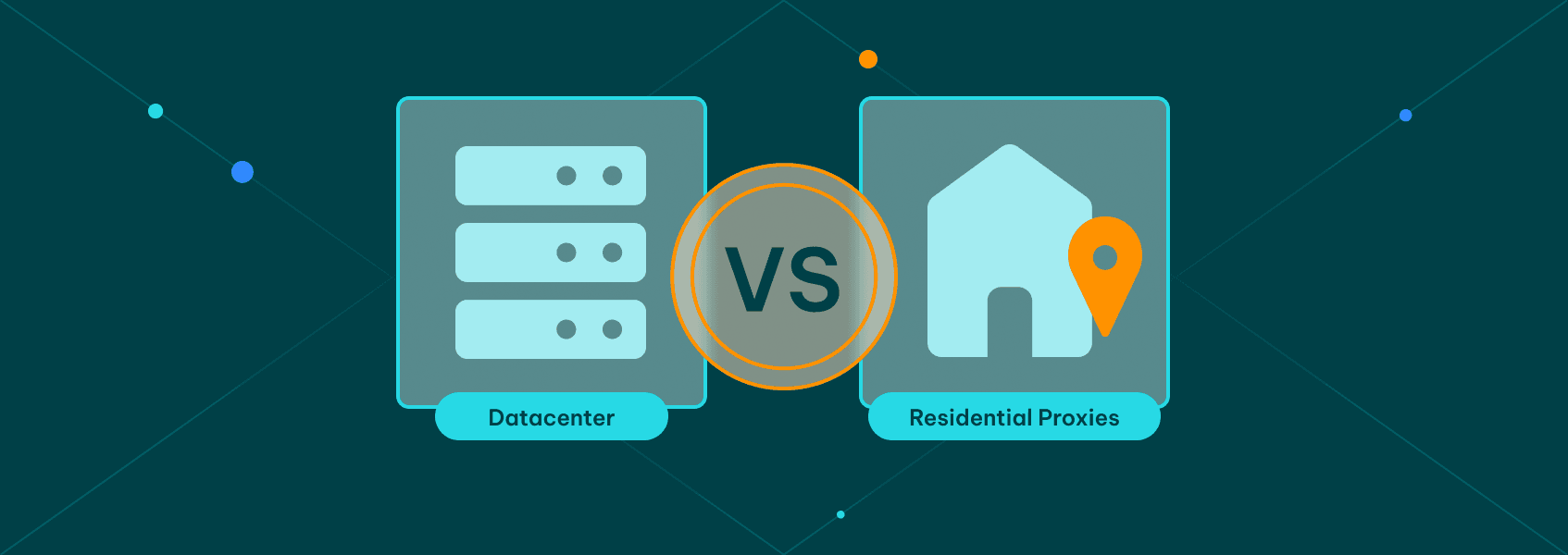When building a proxy infrastructure, one of the first decisions you'll face is choosing between residential and datacenter proxies. This comprehensive comparison will help you understand the key differences and make an informed choice for your specific needs.
Understanding the Basics
Before diving into comparisons, let's clarify what each proxy type actually represents:
Residential Proxies
Residential proxies provide IP addresses that are assigned by Internet Service Providers (ISPs) to homeowners. These IPs are associated with real residential locations and appear as genuine home user connections.
Datacenter Proxies
Datacenter proxies are created in bulk in cloud data centers. They're not affiliated with ISPs and are not tied to physical residential locations. Instead, they're hosted on powerful servers in commercial data centers.

Key Differences: A Detailed Comparison
| Feature | Residential Proxies | Datacenter Proxies |
|---|---|---|
| Origin | Real ISPs, connected to physical locations | Data centers, cloud providers |
| Detection Risk | Low (appear as regular users) | Higher (can be identified as proxies) |
| Speed | Moderate to good | Excellent (optimized for performance) |
| Cost | Higher ($$$) | Lower ($) |
| IP Pool Size | Larger, more diverse | Limited, but sufficient for many tasks |
| Stability | Variable (depends on real users) | Highly stable |
| Authentication | Often username/password | IP authentication or username/password |
Performance Analysis
When it comes to speed and performance, datacenter proxies generally have the edge:
// Sample speed test results (average of 100 requests)
Connection Type | Avg. Response Time | Bandwidth
---------------------------------------------------
Residential | 387ms | 15-25 Mbps
Datacenter | 98ms | 50-100+ MbpsHowever, raw speed isn't everything. For applications requiring authenticity over pure performance, residential proxies maintain a significant advantage.
Best Use Cases by Industry
When to Choose Residential Proxies
- E-commerce & Retail: Price monitoring and competitor analysis on sites with sophisticated anti-bot measures
- Digital Marketing: Ad verification across different geographic locations
- Market Research: Gathering data that varies by location (e.g., local search results)
- Social Media Management: Managing multiple accounts without triggering security flags
- SEO Monitoring: Checking search rankings from different locations
When to Choose Datacenter Proxies
- High-Volume Data Scraping: When speed and cost-efficiency are priorities
- Development & Testing: For testing applications across different IP configurations
- Performance-Critical Applications: Where low latency is essential
- Content Downloading: For applications requiring high bandwidth
- Basic Web Scraping: For sites with minimal anti-bot technologies
"The choice between residential and datacenter proxies isn't about which is better overall, but rather which better serves your specific use case. Sometimes, the ideal solution combines both types."
Implementation Considerations
When implementing either proxy type, consider these factors:
For Residential Proxies:
- Ethical sourcing (ensure providers obtain IPs with proper consent)
- Geographic distribution requirements
- Session persistence needs (sticky vs. rotating options)
- Budget allocation (higher cost per IP)
For Datacenter Proxies:
- IP rotation strategy (to avoid blocks)
- Proxy provider reputation (some datacenter IP ranges are widely blocked)
- Scalability requirements
- Security protocols
Hybrid Approaches
Many sophisticated proxy users implement hybrid strategies, using:
- Datacenter proxies for initial testing and high-volume, less sensitive tasks
- Residential proxies for critical operations where authenticity matters
- Intelligent routing systems that choose the appropriate proxy type based on the target website
Future Trends
The proxy landscape continues to evolve with these emerging trends:
- ISP proxies: A middle-ground option combining datacenter infrastructure with residential IP assignment
- AI-powered proxy routing for optimal performance
- Enhanced authentication and security measures
- Greater geographic diversity in residential proxy pools
Conclusion
The choice between residential and datacenter proxies depends on your specific use cases, budget constraints, and performance requirements. For applications where appearing as an authentic user is critical, residential proxies provide unmatched legitimacy. For speed-intensive operations where cost-efficiency matters, datacenter proxies deliver excellent value.
At ProxyVault, we offer both premium residential and datacenter proxy solutions, allowing you to select the ideal option for your specific needs or implement a hybrid approach. Our expert team can help you develop a comprehensive proxy strategy tailored to your business requirements.



